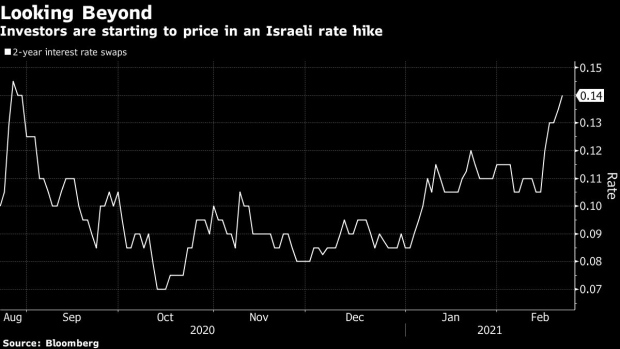Feb 22, 2021
Israel Post-Crisis Policy Clues May Emerge: Decision Day Guide
, Bloomberg News

(Bloomberg) -- Economists will be looking for clues from the Bank of Israel about how it will steer the economy now that Israel has vaccinated almost half the population and is lifting restrictions on commerce.
Markets are beginning to price in interest-rate increases in the coming two years after upbeat 2020 gross domestic product figures and a less-than-expected drop in inflation, while malls, shops and cultural venues reopened for the first time in months. All 12 analysts surveyed by Bloomberg expect the central bank’s monetary committee to leave its key rate at the record low of 0.1% on Monday.
A scenario of rising inflation this year “could set the stage for some thought about an interest rate increase sometime mid-2022,” said Gil Bufman, chief economist at Bank Leumi Le-Israel Ltd.
As the global vaccination campaign picks up pace, officials are beginning to consider normalizing monetary policy. Last week Zambia became the second central bank to hike rates this year while talk about such a move is also happening in countries from Poland to Brazil.
Here’s what else is in focus ahead of the decision:
Shekel Strength
The appreciation of Israel’s currency has been a persistent concern for policy makers, prompting a commitment to buy $30 billion in foreign currency this year to roll back its gains. The shekel has slipped some but still trades near a 25-year high against the dollar set last month.
The Bank of Israel will likely stay away from interest rates hikes until 2023, given the challenge of reducing unemployment and the expected continuation of forces driving the shekel, Goldman Sachs Group Inc. analysts wrote in a note last week. Expanding the central bank’s intervention in the foreign currency market is still an option, Governor Amir Yaron has said.
For more: Speaking of EM: Hapoalim’s Hass on Shekel, Vaccines (Podcast)
Bond Purchases
Yields on longer-dated Israeli government bonds have begun to rise amid increasing economic optimism and inflation. Investors will be looking to see whether the Bank of Israel will let the trend continue, which would threaten cheap borrowing costs for the government and businesses alike, or double down on debt purchases to give more runway for a recovery.
The central bank has committed to buy 85 billion shekels ($26 billion) worth of government bonds to ease credit conditions, so far spending 50 billion shekels.
©2021 Bloomberg L.P.